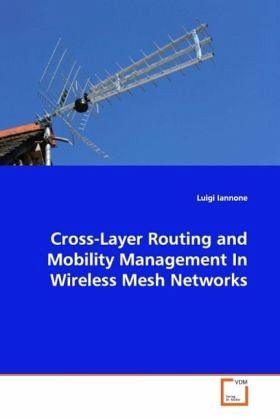
Cross-Layer Routing and Mobility Management In Wireless Mesh Networks
Versandkostenfrei!
Versandfertig in 6-10 Tagen
39,99 €
inkl. MwSt.

PAYBACK Punkte
20 °P sammeln!
Wireless Mesh Networks (WMN), a two-tier architecturebased onWireless Mesh Routers (WMR), has captured theinterest from bothacademia and industry, because of their ability toaccommodate bothWireless ISPs and user requirements. Despite thelarge amount ofresearch developed in this area, several issues stillneed to besolved. In this thesis we design an efficientsolution for multi-hopwireless networks providing the followingcontributions. First, wedesign and formalize Mesh Routing Strategy (MRS), across-layerrouting approach. MRS relies on simple heuristicsable to optimizetransmission power and ro...
Wireless Mesh Networks (WMN), a two-tier architecture
based on
Wireless Mesh Routers (WMR), has captured the
interest from both
academia and industry, because of their ability to
accommodate
both
Wireless ISPs and user requirements. Despite the
large amount of
research developed in this area, several issues still
need to be
solved. In this thesis we design an efficient
solution for multi-hop
wireless networks providing the following
contributions. First, we
design and formalize Mesh Routing Strategy (MRS), a
cross-layer
routing approach. MRS relies on simple heuristics
able to optimize
transmission power and route selection, resulting in
important
increase of the transport capacity of the mesh
backbone. Second, we
design and implement MeshDV, a routing framework
adapted to
WMNs,
which includes MRS and is also able to easily manage user
mobility. Third, we develop MeshDVbox, a custom WMR
built using
off-the-shelf components and deployed in our
laboratory to realize
a
WMN test-bed.
based on
Wireless Mesh Routers (WMR), has captured the
interest from both
academia and industry, because of their ability to
accommodate
both
Wireless ISPs and user requirements. Despite the
large amount of
research developed in this area, several issues still
need to be
solved. In this thesis we design an efficient
solution for multi-hop
wireless networks providing the following
contributions. First, we
design and formalize Mesh Routing Strategy (MRS), a
cross-layer
routing approach. MRS relies on simple heuristics
able to optimize
transmission power and route selection, resulting in
important
increase of the transport capacity of the mesh
backbone. Second, we
design and implement MeshDV, a routing framework
adapted to
WMNs,
which includes MRS and is also able to easily manage user
mobility. Third, we develop MeshDVbox, a custom WMR
built using
off-the-shelf components and deployed in our
laboratory to realize
a
WMN test-bed.












